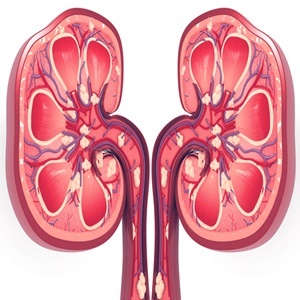Symptoms
Kidney tumors may not hurt or show any signs. Sometimes growth in the kidney can cause:
- Blood in the urine
- Pain in the side, abdomen or back that doesn’t go away
- A lump in your abdomen
- Loss of appetite and weight loss for no known reason
- Anemia and fatigue
If cancer spreads (metastasizes) beyond the kidney, symptoms depend upon where it spreads. Short breath or coughing up blood may occur when cancer is in the lung. Bone pain or fracture may occur when cancer is in the bone. Neurologic symptoms may occur when cancer is in the brain.
Causes
Cancer in the kidney is linked to the following risks:
- Smoking
- Obesity
- Chronic high blood pressure
- Misusing certain pain medicine for a long time
- Von Hippel-Lindau syndrome
- Tuberous sclerosis
- Family history of kidney cancer
Diagnosis
Unfortunately, there are no blood or urine tests that directly detect kidney cancer. Most often a tumor is diagnosed during routine screening for people with genetic risks (e.g. Von Hippel-Lindau disease, tuberous sclerosis). Or it is found when a person sees a doctor about an unrelated problem.
The National Cancer Institute (NCI) lists these tests most often used to diagnose kidney cancer:
- Physical exam and history: A health care professional will examine your body to check general signs of health. They will also check for lumps or anything else that seems unusual. They will ask about your health habits, past illnesses and treatments.
- Ultrasound exam: An image of your kidneys and organs may first be taken with an ultrasound. Here, high-energy sound waves (ultrasound) are bounced off internal tissues or organs and make images.
- Blood chemistry studies: Blood samples are checked to look for certain substances released into the blood by your organs. If amounts are higher or lower than normal, it is a sign of disease.
- Urinalysis: A sample of your urine is tested to see the color and contents. Unusual levels of sugar, protein, red blood cells, and white blood cells can indicate a problem.
Liver function test: A sample of blood is checked to measure the enzymes released by the liver. Unusual levels may be a sign that cancer has spread to the liver.
- Intravenous pyelogram (IVP): A series of x-rays of the kidneys, ureters, and bladder are taken to see if cancer is found there. A contrast dye is injected through a vein. It moves through these organs, and x-rays are taken to look for blockages.
- CT scan (CAT scan or computed tomography): This procedure makes a series of detailed pictures inside the body, taken from different angles. The pictures are made by a computer linked to an x-ray machine. A dye may be used to help see the organs or tissues more clearly.
- MRI (magnetic resonance imaging): This imaging exam uses a magnet, radio waves and a computer to make detailed pictures of organs. Your doctor will get a clearer image of abnormal growths through these images.
- Biopsy: A biopsy is when cells or tissues of an organ are removed and studied. The sample is viewed under a microscope by a pathologist. A pathologist is a doctor who can check for signs of cancer. For renal cell cancer, a thin needle is inserted into the tumor and a sample of tissue is removed for the biopsy.

